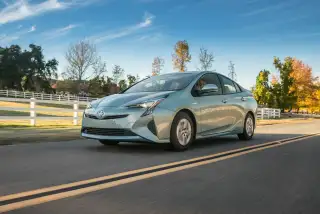New Toyota Prius Is Better Than Ever, but Sales Will Fall Anyway

By most accounts, the revamped 2016 Toyota Prius is a big improvement on the previous model. An early Edmunds review declared that it will be the "go-to choice among hybrids." USA Today's review praised the sportier "new high-tech looks" that'll broaden the car's appeal, as should the addition of more cargo space. And it seems that every mention of the new Prius must include the highlighting of its improved fuel economy—an estimated 54 mpg city, 50 mpg highway, and 52 mpg overall (up from 50 mpg overall in the old model).
Yet despite the raves, Toyota expects sales of the fourth-generation Prius to stay on the same trajectory of the older model—heading downward. This week, Toyota lowered its global forecast for sales of the new Prius to the 300,000-350,000 range, down from the target that topped out at 400,000 for the old model, according to Reuters.
Sales of the Prius—and of hybrids in general—have been falling steadily since 2013. Prius sales fell roughly 12% from 2013 to 2014, while sales of hybrids overall dropped 9% year over year. Sales were even worse in 2015, declining 16% for the first half of the year.
It wasn't supposed to go this way. As recently as 2011, Toyota was predicting that the Prius would be its best-selling car in the U.S. by 2020, supplanting the Camry. But back then, if you'd asked the average person whether it was more likely gas would cost $5 per gallon or $2 per gallon in 2015, almost everyone would have said $5 in a heartbeat.
As of Thursday, the national average for a gallon of regular was $2.01, according to AAA, and many drivers have already seen gas stations charging $1.50 per gallon. Cheap gas prices obviously undercut one of the Prius's main selling points—that you'll save money by owning one thanks to superior fuel economy.
Instead of buying more Priuses and other fuel-efficient models, American drivers have been turning to SUVs, which experienced strong growth in 2014 and 2015 and are forecast to increase market share to 40% as soon as 2020. With gas being cheap, after all, it's easier to go with a Ford Explorer over a Toyota Prius, even though the latter gets mileage that's twice as good.
Besides gas prices, the Prius's appeal has been damaged by the rise of multiple gas-powered models that get 40 mpg or better, as well as the arrival of Tesla and the Nissan Leaf. As Kelley Blue Book's Karl Brauer told me in early 2015—when gas prices were also around $2 per gallon in much of the country—the Prius's status as the "official vehicle of the environmentally conscious" has been chipped away as more fuel-efficient cars, as well as fully electric models, have come onto the scene.
"A lot of the vehicles today get 40+ miles per gallon and you don't have to make the sacrifices you do with the Prius," Brauer said. "And the Tesla has hurt the Prius as much as anything else," because it instantly took the Prius's place as the world's coolest, most environmentally friendly automobile.